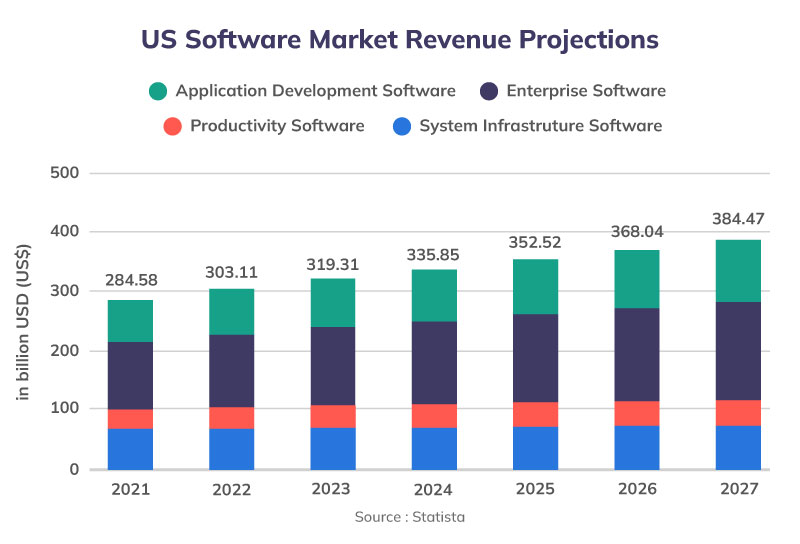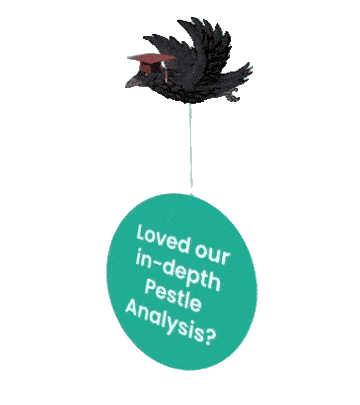Oracle Overview
Oracle is an American company engaged in software development of various kinds including cloud engineering services, database management systems, and many others. The company has huge financial backing and it earned a revenue of more than $40 billion in 2021, the highest since its inception (Vailshery, 2022). It has a free cash flow of $2.74 billion (Yahoo Finance, 2022). The company operates in 62 countries and employs 132, 000 personnel (Vailshery, 2022). Oracle ranked 82 on the Fortune 500 list in 2020.
The PESTLE analysis of Oracle will look into the influence of external business factors that can potentially impact the company. To explain, PESTLE Analysis is a highly efficient tool to analyze the external environment that can impact the industry. The PESTLE tool analyzes the impact of the political, economic, social, technological, legal as well as environmental factors that can have an impact on the software industry. For an effective comprehension of the analysis, go through our complete pestle analysis guide.
This analysis would prove to be beneficial for software companies including Oracle to formulate strategies for efficient operations in the US as well as Germany. So, let’s get started.
Table of Contents
A scrupulous PESTLE Analysis of Oracle
Political factors affecting Oracle
Political stability has a great impact on the smooth operations of the companies and the US has a highly stable political environment. The tax regime is utmostly favorable for the software industry in the US wherein the industry is just taxed in 17 states and exempted in the rest of the states. Further, software maintenance contracts are also taxed in just 24 states. Thus, the companies can save a lot in financial terms (Avalara, 2022).
Furthermore, the federal government in the US has proposed to set up a fund of $110 billion for research in artificial intelligence. This can lead to new innovations and the companies would benefit in terms of new product development.
Furthermore, Germany is also one of the important markets for software companies and German tax regulations state that the companies are liable to pay 15% royalties if they have a limited tax liability in Germany which can put a financial burden on the companies if they do not have full-fledged operations in the country (Osborne Clarke, 2018).
Economic factors affecting Oracle
The growth rate of the US for the year ending 2021 was 5.7% (Wiseman, 2022). It is expected to witness a downward trend of 4% in 2022 and 2.6% in 2023 respectively (Shalal and Lawder, 2022). The decrease in growth rate means a decline in business investments and hence, the sales of the software companies would decrease. Further, the inflation in the US has increased enormously in 2021 at 7.5% and the higher inflation rate would increase the cost of the output of the software companies, thereby leading to an increase in the prices.
The increase in the prices would lessen the demand, thus negatively impacting the sales of the software companies. In addition, the expenditure of the businesses on cybersecurity is rising and currently, it is estimated that many businesses spend around 6%-14% of their budget on cybersecurity tools because of the rising threat of attacks and fear of loss of personal data.
The huge proportion of budget meant just to boost the IT infrastructure is the positive news for the software companies as they stand a good chance to increase their sales. Tech spending in the US is increasing exponentially as businesses are integrating IT solutions based on big data, machine learning, and cloud computing and this will provide greater opportunities for the software industry.
Further, the growth rate of Germany is just 2.8% and is expected to be 3.6% in 2022 and 2.6% in 2023 (EU, 2022). The businesses would have uncertainties in mind for making investments because of the high fluctuation which would ultimately impact the sales of the software companies.
The software industry in the US is currently worth $313.70 billion and is projected to reach and is predicted to rise to $733 billion by 2028 at a CAGR of 24.3%. The projections for the US software industry are further illustrated in the below graphic.

Social factors affecting Oracle
COVID has had a large impact on businesses in the US and around 22% of businesses have been shut down because of the high losses and the situation is not expected to improve in the near term. This could have a long-term impact on the sales of the software (Fairlie, 2021). But the high digital literacy rate of 84% among the community members can be a positive sign as this would increase the demand for a variety of innovative software.
Further, In Germany, due to COVID, around 60% of the workforce is working from home and this can increase the software to conduct the business operations digitally, hence would have a positive impact on the demand for software companies (Statista, 2022). Further, Germany is the most autonomous economy in the EU and the businesses are fastly moving towards digitization. This can present a significant opportunity for software companies to enhance their footprint. Moreover, the rapid scale of innovation in the business world poses a great opportunity for the software industry.
The business environment in today’s time is becoming more competitive because of which IT solutions from the most trusted tech companies are in higher demand. The reason for the trust in high-end companies is that solutions are more secure, versatile, and efficient. Hence, the software companies should try and launch the software that provides maximum convenience and benefit to the customers. For constant refinements, software companies should look to optimize their change management process.
Technological factors affecting Oracle
Both the US and Germany spend heavily on R&D in technology. The US government spent $157 billion on research in the technology sector while the German government spent 104 billion euros in 2021 (Ministry of Education and Research). Various technologies that have emerged in the software industry include the use of artificial intelligence on the large scale for various operations.
Further, the UI/UX is gaining more popularity and it has led to an increase in user interface quality and overall experience. In addition, the new trend of serverless computing is evolving which has led to fewer infrastructure requirements for software development and faster development cycles. Another technology that is being used widely is the tools related to cybersecurity because of increasing cyberthreats.
The rising cybersecurity concerns in business can be a positive opportunity for software companies to market their cybersecurity tools. Further, the use of cloud computing for storing data has eased the problems of businesses related to data management. Besides, robotic process automation, edge computing, quantum computing, blockchain technology, and IoT are the other leading emerging technologies in the industry.
Legal factors affecting Oracle
Laws such as The Sherman Act 1872 wherein it is prohibited to form a cartel and fix prices or create a monopoly govern the software industry. Further, the Privacy Act 1974 regulates the collection, storage, and use of data by software companies (Department of Justice, 2022). The intellectual property regulations allow businesses to innovate and register their patents for 20 years.
The other laws that govern the software industry include General Data Protection Regulation wherein the companies are required to maintain the confidentiality of the data obtained from the customers and the software companies are responsible for ensuring that their third-party vendors also comply with the norms.
In addition, the IT companies process most of the payments online so they are also covered under Payment Card Industry Data Security Standard which contains the information related to securing data and preventing financial fraud.
Data privacy in Germany is regulated by two laws: EU General Data Protection Regulation (GDPR), and German Privacy Act. The companies must not be allowed to transfer the data out of German servers to any other country and the companies must appoint a Data Protection Officer to oversee the data (Deloitte, 2018).
Environment factors affecting Oracle
Both the US and Germany are signatories to the International Paris Agreement and as a result, the US government has set a target to cut down the carbon emissions by 50% by 2030 (White House, 2021). Moreover, the federal government in Germany has decided to cut emissions by 65% by 2030. The software industry in the US contributes hugely to the total greenhouse gas emissions through data centers.
Because of the government target, the industry would have to search for innovative means to design software and operate their data centers. One of the options would be to convert their data centers into totally green data centers wherein the energy is fully sourced through renewable means like the installation of solar panels. This can lead to an increase in the cost for the companies.
To conclude, it can be said that the software industry can flourish in the US and make most of the tax exemptions in various states but in Germany, the companies can be at a disadvantage if they do not have full-fledged operations as then they would need to incur extra expenditure in the form of royalties. Also, the projected growth for the software industry is very high and the companies can take advantage of that. Further, the prospects of working from home and establishing businesses are high which the companies can also benefit from. This PESTLE analysis successfully identifies the various opportunities and threats pertinent to the software industry. Besides, the threats and opportunities in the context of Oracle can also be recognized using a meticulous SWOT Analysis of Oracle.
Recommended Readings
References
European Commission. (2022). Economic forecast for Germany. Retrieved 11 April 2022, from https://ec.europa.eu/info/business-economy-euro/economic-performance-and-forecasts/economic-performance-country/germany/economic-forecast-germany_en
Hilberg, D. The new German Privacy Act. Retrieved 11 April 2022, from https://www2.deloitte.com/dl/en/pages/legal/articles/neues-bundesdatenschutzgesetz.html
Osborne Clarke. (2018). German Withholding Tax in the Context of Software Licensing. Retrieved 11 April 2022, from https://www.osborneclarke.com/insights/28684germanwithholdingtaxinthecontextofsoftwarelicensing#:~:text=The%20German%20Income%20Tax%20Act,limited%20tax%20liability%20in%20Germany.
Wickramasinghe, S. (2021). Today’s Top Trends in Software Development. Retrieved 11 April 2022, from https://www.bmc.com/blogs/software-app-development-trends/
Winn, P., & Stokes, K. (2021). PRIVACY ACT OF 1974. Retrieved 11 April 2022, from https://www.justice.gov/opcl/privacy-act-1974

 Proof Reading
Proof Reading  Copy Writing
Copy Writing  Resume Writing
Resume Writing  Blogs
Blogs Guides
Guides SOP's
SOP's Student Resources
Student Resources Research Topics
Research Topics Login
Login Register
Register



